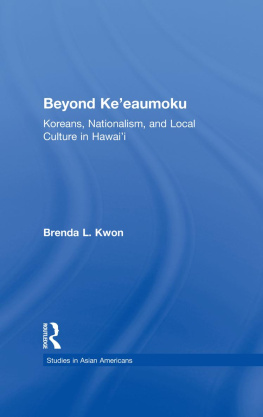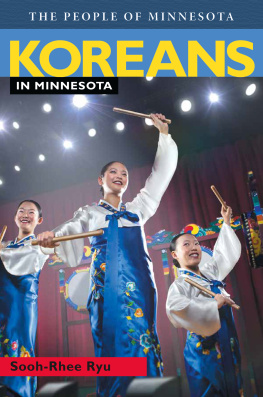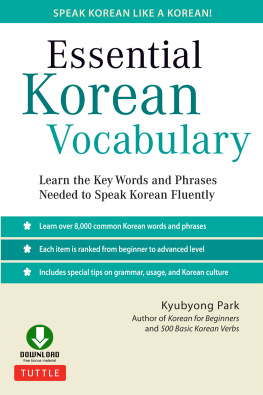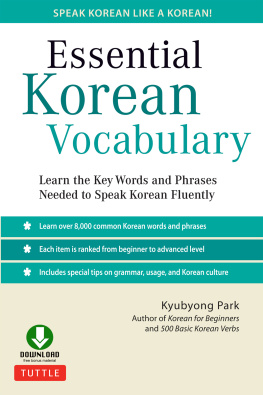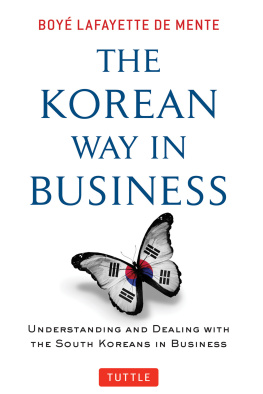About the Contributors
The Editor:
Pyong Gap Min is a Distinguished Professor of Sociology at Queens College and the Graduate Center of the City University of New York. He also serves as Director of the Research Center for Korean Community at Queens College. The areas of his research interest are immigration, ethnic identity, ethnic business, immigrants religious practices, and family/gender, with a special focus on Asian/Korean Americans. He is the author of five books, all focusing on Korean immigrants experiences. They include Caught in the Middle: Korean Communities in New York and Los Angeles (1996), the winner of two national book awards, and Preserving Ethnicity through Religion in America: Korean Protestants and Indian Hindus across Generations (2010), the winner of three national book awards, one in Korea and the other two in the United States. His eight edited or co-edited books include Encyclopedia of Racism in the United States, 3 volumes (2005) and Asian Americans: Contemporary Trends and Issues, the Second Edition (2006). He received the Distinguished Career Award from the International Migration Section of the American Sociological Association in 2012. He completed his undergraduate education at Seoul National University majoring in history. He received a masters degree in history and two Ph.D. degrees, one in educational philosophy and the other in sociology, all from Georgia State University.
Contributors:
Joe Jeong Ho Han graduated from University of Toronto with a double major in Psychology and Neuroscience. He is primarily interested in transnational migration and immigrant life among Koreans. He worked at CAMH (Centre for Addiction and Mental Health) under Dr. Samuel Noh to complete the paper on Transnational Interactions among Korean Immigrants in Toronto and currently seeks to start a graduate studies program.
Ann H. Kim is an assistant professor of sociology at York University. Her research is largely motivated by questions related to the immigrant and ethnic integration process. She has studied the experiences of Korean immigrants in relation to ethnic entrepreneurship, living arrangements, and new destinations, and currently, she is working on two major projects, one on Korean transnational families and another on the gendered and racialized patterns of economic security among seniors. She has a forthcoming co-edited book entitled, Korean Immigrants in Canada: Perspectives on Migration, Integration and the Family.
Min-Jung Kwak is a human geographer who currently teaches in the Urban Studies Program at University of Toronto. Her research interests broadly cover the areas of globalization, transnational migration, immigrant entrepreneurship, urban housing and labor market issues, and family and gender relations. She has been particularly interested in the Korean Canadian communities in major Canadian cities. She has published policy reports, book chapters, and journal articles. The most recent publication includes an article published in the Journal of International Migration and Integration.
Helene Lee received her Ph.D. in Sociology from the University of California, Santa Barbara, and is an Assistant Professor in the Department of Sociology at Dickinson College. She is currently working on a book manuscript exploring the impact of return migration projects to the ancestral homeland (South Korea) on two diasporic Korean communitiesKorean Americans and Korean Chinese (Joseonjok). Her continued research interests focus on how individuals construct and maintain complicated transnational Korean identities at the intersections of gender, ethnicity and nationality.
Se Hwa Lee is a Ph.D. candidate in Sociology at the University at Albany, State University of New York. Her research is centered on gender, family, international migration and womens leadership. Her recent paper about womens political representation was accepted with minor revisions by the Journal of Women, Politics and Policy (JWPP). She also serves as an occasional reviewer for JWPP. She was the Chair of the Program Scheduling Committee and a member of the Session Paneling Committee for the 2011 Eastern Sociological Society (ESS) annual meeting. She currently is working on her dissertation, titled Korean Wild Geese Families, A New Trend of Transnational Migration: Split Household Strategies and Gender Dynamics with the support of a dissertation scholarship from the Research Center for the Korean Community at Queens College of CUNY.
Samuel Noh currently holds an Endowed Professorship, the David Crombie Professor of Cultural Pluralism in Health, in the Department of Psychiatry at the University of Toronto. He also serves as the Co-Director of the Equity, Gender and Population Health Division Culture, Community and Health Studies Program, a post-graduate psychiatry residence training and research program. He is Senior Research Scientist at the Centre for Addiction and Mental Health, where he founded and directed a program in Social Equity and Health Research, including a post-doctoral research training program in social determinants of mental health. He has published over one-hundred articles, book chapters, and abstracts. He has delivered over two-hundred refereed presentations and invited lectures and seminal presentations.
Linda S. Park has just completed her Ph.D. program in the Department of Human Development and Family Studies at the University of Wisconsin-Madison. Her doctoral studies include two minors: Research Methods in Cultural Studies and Social Welfare with a focus on policy. Her dissertation explores issues of authenticity for second-generation Korean Americans focusing on a little-known cohort of Korean immigrants. Linda also has two masters degrees, one in Social Work and the other in Business Management & Human Resources. In 2010, she received a dissertation scholarship from the Research Center for Korean Community. She is a second-generation Korean American born in Washington, D.C. in the early 1960s. She is an active member of both Korean and Asian American communities in Madison, Wisconsin.
Wansoo Park is an associate professor at the School of Social Work, University of Windsor, Ontario, Canada. Her areas of interest in research, practice, and teaching are grounded in promoting civic engagement, social inclusion and making connections between and amongst individuals, families, institutions, communities, programs, and policies in multicultural society. She is particularly interested in the area of health and mental health among immigrant and transnational families across life span. One of her current projects is exploring ways to promote health and well-being among seniors and residents in low-income housing neighborhoods through communityuniversity partnerships.
Dr. Sung Hyun Yun is an associate professor at the School of Social Work, University of Windsor, Ontario, Canada. As a social work scholar who works with/for the community, he has developed a series of research efforts grounded in anti-oppressive perspectives, human empowerment, transnationalism, and pro-feminist frameworks embedded in global and interdisciplinary context. His research aims not only to generate knowledge and understanding about people in need and societal challenges, but more importantly, to develop effective treatment and intervention directly applicable to social work practice. His research also highlights the importance of evidence-based and outcome-driven teaching/learning components that are judiciously integrated with effective social work practice.
Acknowledgments
I need to acknowledge a number of people whose assistance has made the publication of this book possible. First of all, I would not have been able to publish this book without five important chapters contributed by my colleagues, and I would like to extend my gratitude to the contributors for writing and revising their chapters in a timely manner. I also owe special thanks to Thomas Chung, the editor of the Research Center for Korean Community, for editing all manuscripts meticulously and formatting the final draft of the book manuscript to make it available for camera-ready printing. I also would like to thank Saehee Kim and Claire Kim for analyzing immigration and census data effectively. The results of their data analyses were my foundations for writing Chapters 2 and 3. In addition, Eun-been Lee, Saehee Kim, and Dong Wan Joo deserve my gratitude for spending many hours in preparing and updating the literature on Korean Americans. I also need to express thanks to Chigon Kim for replacing many tables in Chapters 2 and 3 with figures and changing several tables and figures in Chapters 3 and 7 by eliminating colors.


